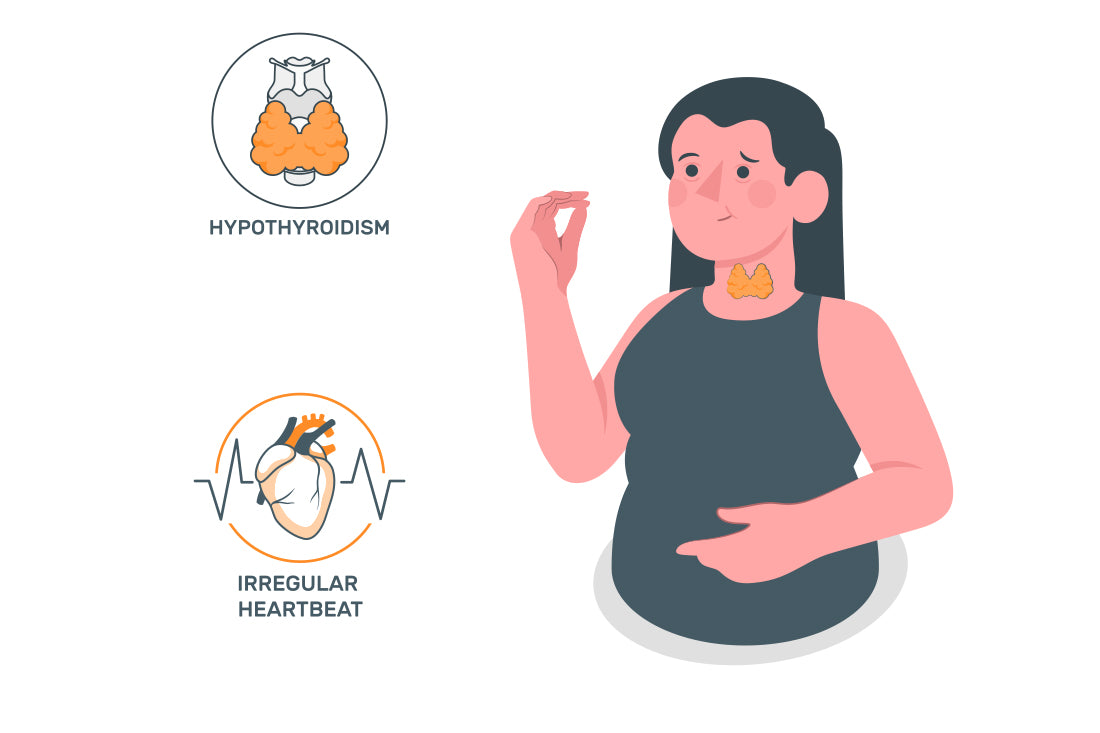The thyroid is a small gland in the neck that makes thyroid hormones. These hormones help your body use energy, grow, and function properly. Sometimes, the thyroid can make too much or too little thyroid hormones. This can cause thyroid disorders, such as hypothyroidism (low thyroid) or hyperthyroidism (high thyroid).
Thyroid disorders can affect your heart and blood vessels in different ways. They can change your blood pressure, heart rate, cholesterol levels, and risk of heart disease. In this blog post, we will explain how thyroid disorders can increase the chance of having cardiovascular disease, which is a term for problems that affect the heart or blood vessels.
How Does Hypothyroidism Affect the Cardiovascular System?
Hypothyroidism means that your thyroid does not make enough thyroid hormones. This can slow down your metabolism and make you feel tired, cold, and depressed. It can also affect your cardiovascular system in the following ways:
- Increased blood pressure: Hypothyroidism can make your blood vessels stiff and narrow. This makes it harder for blood to flow through them and raises your blood pressure. High blood pressure can damage your arteries and make your heart work harder. This can increase your risk of having a heart attack or stroke.
- Decreased heart rate and strength: Hypothyroidism can lower your heart rate, which is how fast your heart beats. It can also reduce your heart's strength, which is how much blood it pumps with each beat. This can make it harder for your heart to deliver enough oxygen and nutrients to your body, especially when you exercise or are stressed. This can cause symptoms like fatigue, shortness of breath, chest pain, and swelling in your legs. In severe cases, it can lead to heart failure, which is when your heart cannot pump enough blood to keep you alive.
- Increased cholesterol levels: Hypothyroidism can affect how your body breaks down fats and sugars. This can cause your cholesterol levels to go up. Cholesterol is a type of fat that travels in your blood. Some cholesterol is good for your body, but too much can build up in your arteries and block blood flow. This can also increase your risk of having a heart attack or stroke.
How Does Hyperthyroidism Affect the Cardiovascular System?
Hyperthyroidism means that your thyroid makes too much thyroid hormones. This can speed up your metabolism and make you feel nervous, hot, and restless. It can also affect your cardiovascular system in the following ways:
- Increased heart rate: Hyperthyroidism can raise your heart rate and make your heart beat harder and faster. This can make your heart use more oxygen and energy than normal. This can cause symptoms like palpitations, chest pain, and shortness of breath. In severe cases, it can lead to arrhythmia, which is when your heart beats irregularly or abnormally. This can affect how well your heart pumps blood and can cause serious problems like fainting, stroke, or sudden death.
- Decreased blood pressure: Hyperthyroidism can make your blood vessels relax and widen. This lowers the resistance to blood flow and reduces your blood pressure. Low blood pressure can cause symptoms like dizziness, light-headedness, and fainting. It can also reduce the blood flow to your vital organs, such as your brain and kidneys. This can cause damage or failure of these organs.
- Decreased cholesterol levels: Hyperthyroidism can affect how your body breaks down fats and sugars. This can cause your cholesterol levels to go down. This may sound like a good thing, but it can also have negative effects. Low cholesterol levels can affect your hormone production, immune system, and brain function. It can also increase your risk of bleeding and infection.
How to Prevent or Treat Cardiovascular Disease in Thyroid Patients?
If you have a thyroid disorder, you should see your doctor regularly and take your medication as prescribed. This can help you control your thyroid hormone levels and prevent or treat the effects on your cardiovascular system. You should also follow a healthy lifestyle that includes:
- Eating a balanced diet that is low in salt, saturated fat, and added sugar
- Getting regular physical activity that is appropriate for your condition and fitness level
- Quitting smoking and avoiding secondary smoke
- Limiting alcohol and caffeine intake
- Managing stress and getting enough sleep
- Checking your blood pressure and cholesterol levels regularly
- Taking care of any other health problems that can affect your heart, such as diabetes, obesity, or anemia
You should also be aware of the signs and symptoms of cardiovascular disease, such as chest pain, shortness of breath, palpitations, dizziness, or fainting. If you experience any of these, you should seek medical attention right away. Early diagnosis and treatment can save your life and improve your quality of life.






